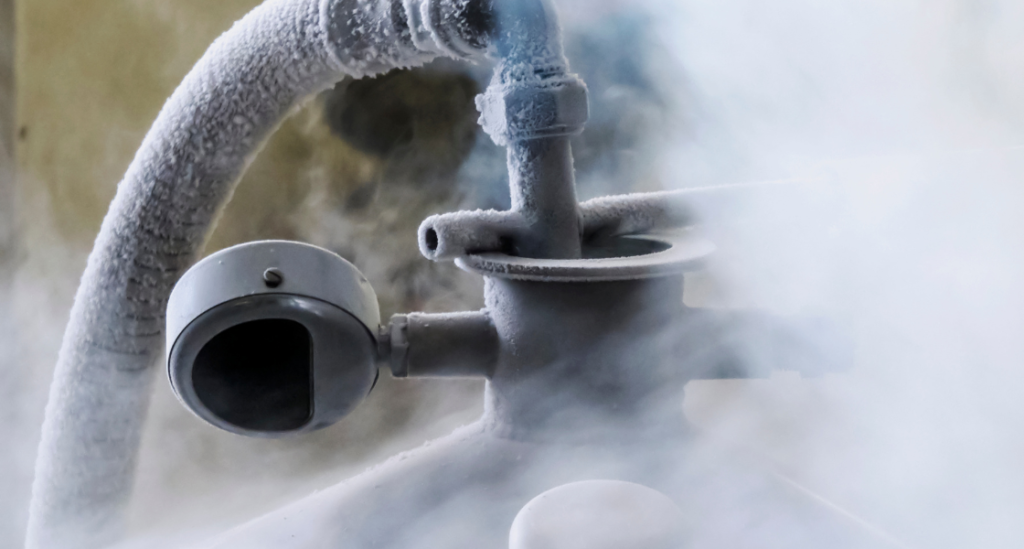Wheeled vehicles have assisted humans for millennia, with the earliest evidence of their use dating back to at least 3,500 B.C.E. Since then, we have been on a journey of improvement and innovation to drive society forward by making wheels more efficient. First, the wooden spoke wheel was invented in India around 2,000 B.CE., making chariots lighter and more durable. Then, a patent for a wire-spoke wheel was filed in 1826, building on the improvements of its ancient predecessor.
Arguably the most significant leap in wheel technology in the modern era was the invention of the pneumatic, or air-filled, tire in 1845. This wheel featured a hollow leather tire around a rubber tube filled with air, which allowed it to grip the road better and increase vehicular control. Air-filled tires became the standard until the benefits of using nitrogen in tires became apparent.
Compared to air, nitrogen retains pressure better, improves control, reduces the risks of sudden tire failures, and wears down on wheels less.
To explain how and why nitrogen is the optimal gas to fill your tires with, below is the ultimate guide to the science behind nitrogen in tires.
Table of Contents
ToggleWhat is Nitrogen, and How Does it Differ From Oxygen?
Nitrogen is the most abundant chemical element in the Earth’s atmosphere, making up around 78%. It is an inert gas, meaning that it does not react with other substances under normal conditions. Nitrogen differs from oxygen, which makes up around 21% of the atmosphere because it is a larger molecule and does not readily dissolve in water.
What Are the Key Properties of Nitrogen?
Nitrogen has several fundamental properties that make it useful in tires. As mentioned above, it is an inert gas, which means it does not react with other substances. Furthermore, it is considerably safe than other tire-filling alternatives since it is non-flammable. Nitrogen also has a larger molecular size than oxygen, which allows it to provide better pressure retention in tires since the gas is less prone to leaking out over time.
What Are Nitrogen’s Inert Nature and Its Benefits for Tires?
The inert nature of nitrogen is one of the key reasons why it’s an ideal gas with which to fill tires. Nitrogen is an odorless, colorless, and non-reactive gas that does not interact with other substances. This means that when nitrogen is used to fill tires, it will not react with the rubber compounds used in tire manufacturing, nor will it corrode the inside of the tire or the wheel.
In contrast, other gases, such as oxygen, can cause corrosion and rust in tires and wheels. Oxygen, for example, is highly reactive and can readily combine with other elements, forming oxides that can cause rust and corrosion. Additionally, oxygen can retain moisture, leading to further decay and rusting. This fact is especially true in humid environments or when a vehicle is regularly driven in wet conditions.
By using nitrogen to fill tires, drivers can avoid these issues altogether. Nitrogen does not react with other substances, nor does it contain moisture. As a result, tires filled with nitrogen last longer and require less maintenance, saving drivers time and money in the long run.
When Was Nitrogen First Used in Tires?
While accounts differ, nitrogen was first used in tires between the 1970s and 1980s. One of the first notable examples of nitrogen tire use is a Federal Aviation Administration (FAA) mandate in 1987 that all airplanes should use nitrogen tires. In recent years, nitrogen tires have become immensely popular in racing due to their improved safety.
While nitrogen-filled tires have many advantages, they require regular maintenance to keep them functioning at their best. We will delve into the importance of regular nitrogen tire maintenance and provide tips on properly caring for your nitrogen-filled tires. Whether you’re a seasoned car enthusiast or a first-time nitrogen tire user, this guide will help you understand the benefits of nitrogen tires and how to keep them in top condition.

How Nitrogen Improves Fuel Efficiency
When nitrogen is used to fill tires, it helps to maintain tire pressure consistently, reducing the need for frequent inflation adjustments. This, in turn, helps to reduce the amount of energy required to move the vehicle, resulting in lower fuel consumption.
Additionally, nitrogen-filled tires can reduce the rolling resistance of the tire, which is the force that opposes the motion of the tire. Lower rolling resistance means the engine does not have to work as hard to move the vehicle, further reducing fuel consumption, which can be particularly beneficial for high-performance race cars, where every bit of efficiency counts in gaining a competitive edge.
By using nitrogen-filled tires, race car drivers can help improve their lap times and overall performance while also reducing their fuel consumption.
Nitrogen’s Role in Extending Tire Life
Tires filled with nitrogen last longer than those filled with air because nitrogen does not contain moisture or reactive substances. What this means is that the tire and the wheel are less likely to corrode or degrade over time. In addition, nitrogen’s larger molecular size provides better pressure retention, which means that the tire maintains its shape and size for extended periods.
Nitrogen’s Impact on Safety and Performance
Nitrogen-filled tires offer superior safety and performance when compared to tires filled with regular air. One of the significant advantages of nitrogen is its ability to retain tire pressure for extended periods. The stable pressure allows the tire to maintain a consistent contact patch with the road surface, providing better grip and improved handling, resulting in a smoother ride.
Furthermore, the risk of sudden tire failure is significantly reduced with nitrogen-filled tires. Air-filled tires can be more prone to pressure changes in extreme weather conditions, such as hot summers or cold winters. This is because air contains moisture which can expand and contract with temperature changes, leading to fluctuations in tire pressure. In contrast, nitrogen does not retain moisture, which means it can better maintain a stable pressure even in extreme temperatures. This makes nitrogen-filled tires an excellent choice for drivers who frequently encounter extreme weather conditions. Additionally, nitrogen-filled tires can also reduce the risk of tire blowouts during long journeys, as the tires are less likely to overheat due to their stable pressure.
Overall, nitrogen-filled tires can provide a safer and more reliable driving experience in all weather conditions.
Discover the Science Behind Better Tires
Using nitrogen in tires is a simple yet effective way to improve the performance and lifespan of your tires. Understanding the science behind nitrogen-filled tires can help you make informed decisions about your tire maintenance and improve your driving experience.
We’re passionate about tire performance and can help you understand the benefits of nitrogen-filled tires and how they can make a difference in your driving experience. Our team is committed to providing high-quality services and will ensure that your tires are filled with nitrogen safely and efficiently. If you’d like to harness the power of nitrogen in your tires, contact our team of experts today.


